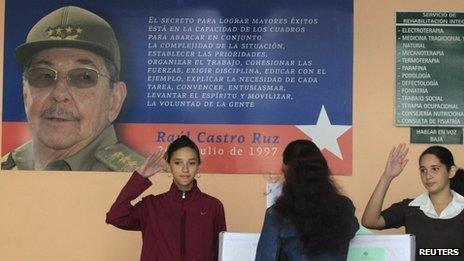Cuba's Castros prepare to step back after end-of-era election
- Published

Barring some extraordinary event, Cuba's Communist President Raul Castro will be re-elected on Sunday and begin what should be his final term in office.
Elected in 2008 to replace his brother Fidel as president after more than four decades, Raul has called for a two-term limit for all senior positions, although the constitution has yet to be amended.
As Cuba's original revolutionary generation prepares to step back from the helm, their focus is on safeguarding the system they have built and ensuring its survival once they are gone.
That will ultimately mean finding a successor to Raul Castro.
So far, though, the accent has been on economic reform - what's termed an updating of Cuba's inefficient state-controlled economy, according to guidelines laid out in 2011.
'Too much pressure'
The most obvious result has been an explosion of small businesses, from nail parlours to gardeners-for-hire, made legal as the government attempts to cut the number of workers on the state payroll.
"I used to earn 400 pesos a month ($16;£10), now I make whatever I'm capable of," says Eduardo Garcia, who sits in a basement workshop surrounded by stereos and TV sets in need of repair.
One flat-screen TV he is working on is worth more than $2,000 (£1,318) - another sign of the changes here.
But like many of Cuba's nearly half-a-million self-employed, Eduardo has his frustrations.
"It's like they've released our hands but not our feet. We're working under way too much pressure," he complains, saying that a state monopoly on imports and the lack of a wholesale market make getting spare parts very difficult.
"But for 54 years, no-one thought even this would have been possible," Eduardo points out. "The machine's slow as it starts up but we have hopes things will improve."
Tackling the big state enterprises that still dominate the economy is the next challenge for the new government that will also be formed on Sunday.
One new experiment will grant firms more autonomy, to boost efficiency; another will allow a limited number of co-operatives in sectors other than agriculture for the first time.
A quote from Raul Castro on a Havana billboard states the situation starkly: "The economic battle is, today more than ever, the principle task."
Tough patch
"It is a battle, and the future of Cuba depends on its results," state economist Juan Triana agrees, saying that five decades after its revolution Cuba is busy "reinventing socialism".
"We won the hardest battle in the 1990s, when the Soviet Union disappeared and Cuba was alone in the world. It was hard, but we are alive," he says.
But as the new deputies take their seats in parliament and Cuba's leaders are appointed, there are concerns that another tough patch lies ahead.
Venezuela has become a key economic ally for Cuba under Socialist President Hugo Chavez, crucially in providing most of its daily oil needs at knock-down prices. Mr Chavez returned to Caracas this week from Havana where he was again treated for cancer. But he remains very ill and has not been seen in person since December.
"Venezuela is an important piece of the jigsaw," says Paul Hare, a former British ambassador to Havana.
"What happens there determines how quickly Cuba will need to open up its economy, whether there'll be a rush for a China-type solution if Venezuela cuts the subsidies, the oil. So there is an urgency about the reforms now, that wasn't there before."
Even so, the pace remains cautious. "Without pause, but without haste," according to Raul Castro.
'Important gain'
The goal is to adjust the system without undermining it. But the relationship between state and citizen is already changing.
"All these measures that make the citizen economically independent from the state are generating a feeling of freedom in people," writer and essayist Leonardo Padura notes.
"I think it's an important gain in Cuban society."
The introduction of income tax is one clear sign of that shift, as Cubans increasingly move from depending on the state to supporting it through their taxes.
"They are now the dynamic element of Cuban society. I think the loosening up in Cuba won't come from political organisations, it will come from the self-employed and others breaking down the barriers," says Mr Hare.
"People will think 'that will produce my iPad for me, the old system won't'."
Economic change in Cuba has not been matched by political reform. The election that produced this parliament saw 612 candidates for 612 seats.
One of them was 86-year-old Fidel Castro, who turned up to vote in person for the first time since he fell ill and stepped aside in 2006.
Seven years on, there is still no obvious successor to the Castros waiting in the wings.
A change in the choice for Cuba's No 2 post - first vice-president - might provide some hint. The position is currently held by another octogenarian revolutionary.
Miguel Diaz-Canel, 53, is one rumoured alternative, a Politburo member who has increasingly been standing in for Raul Castro at official engagements.
But few real clues have emerged from behind the closed doors of Cuban politics.
As the island enters a decisive new term, that key question about its future remains unanswered.
- Published4 February 2013
- Published12 January 2012
- Published25 February 2013